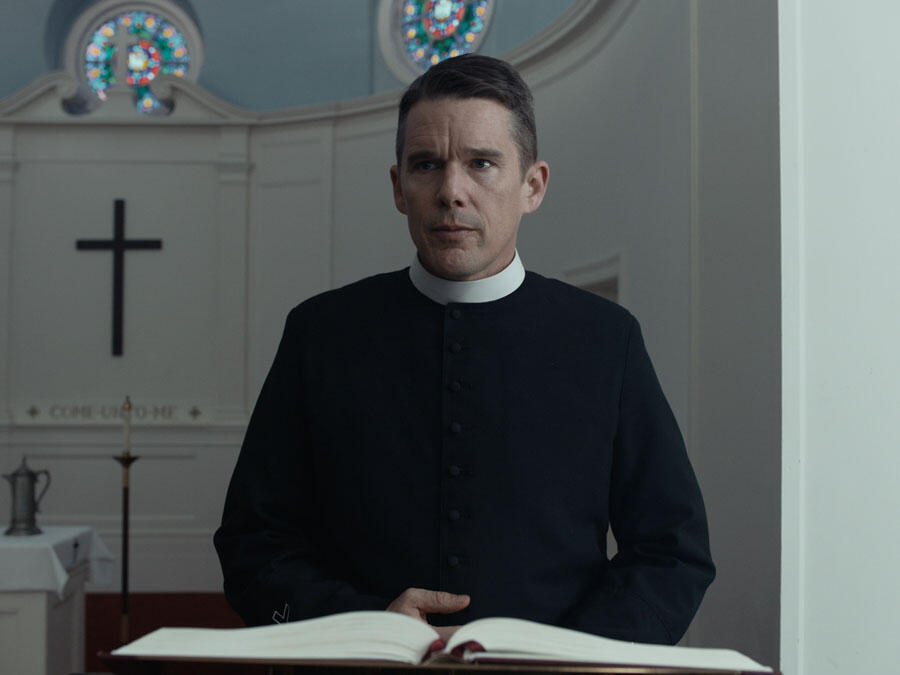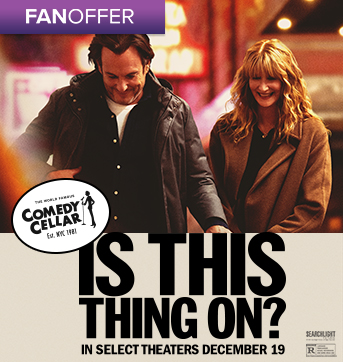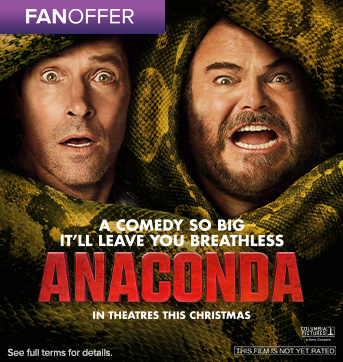
Paul Schrader has been writing films since 1974. He’s been directing since 1977. And although he’s built up a formidable filmography of directed titles—Cat People, Affliction, American Gigolo, Light Sleeper, Mishima: A Life in Four Chapters—Schrader is still most closely associated with his original Taxi Driver script. There’s so much lore about Taxi Driver because it announced Martin Scorsese was here to stay as a major voice in American cinema, it made Robert De Niro a permanent leading man, it defined a burgeoning movement of New Hollywood that defied old conventions, and many would argue that it gave us the first major anti-hero. Some of the lore around Schrader’s script is that he wrote it in just a few days, holed up in an apartment, exercising demons.
Schrader went on to adapt a few more scripts for Scorsese (including Raging Bull) and to direct many films on his own. The hard-boiled writer also made a series of low-budget crime movies this century. And now, somewhat surprisingly, he’s getting the best reviews of his director career at 72 years old. The surprise is that the writer who’s so closely associated with violent portrayals of isolated men is getting those fantastic reviews for a spiritual crisis of faith film, First Reformed. But don’t worry, though - Reformed has a very formal spiritual style, it has a character throughline that very closely resembles Taxi Driver. And those reviews (currently 98% at Rotten Tomatoes) are extremely warranted.
First Reformed stars Ethan Hawke as Reverend Toller, a small-town priest who preaches at an old church that was once used as a hiding spot along the Underground Railroad. The organ doesn’t work, the congregation is in the dozens (if lucky), and Reverend Toller is ill. He’s mostly left alone, other than giving tour guides to schools or tourists, or doing the routine check in with the super-sized church that funds his smaller church, purely for those tourism dollars. One day, a local woman (Amanda Seyfried) approaches the Priest to invite him over to talk to her husband, who’s just been released from jail for acts of environmental terrorism. She is pregnant, and her husband believes that it is unjust to bring a child into the world when all the science shows that their child will inherit a scorched earth within 33 years. The priest provides counsel, but matters get complicated when Seyfried discovers a suicide bomber vest in her garage. Cedric Kyles (aka Cedric the Entertainer) plays a Reverend that represents the much larger church, attempts to counsel Reverend Toller, and also attempts to make their largest donor, the CEO of a global top 5 polluter, happy.
We recently got the chance to sit down with both Schrader and Hawke to talk about First Reformed and chiefly how closely it mirrors Taxi Driver, though it ends up in a different spiritual place. The plot machinations that get the movie to those crossroads remain a secret in this discussion, but Schrader reveals how this script was the closing of a 50-year career long circle. He informs us on how his Calvinist upbringing kept him from viewing films until his late teens, which filmmakers caught his attention once he finally watched films, how the reception to Scorsese’s The Last Temptation of Christ (which Schrader adapted) made him change course with this movie, and finally, how spiritual films differ from faith-based films. Quotes from both Schrader and Hawke run below. And First Reformed starts its rollout into theaters, May 18. Fans of Schrader, Hawke and Taxi Driver will not want to miss it.

On Their Cinematic Influences
Schrader was raised by Calvinist parents in Grand Rapids, Michigan, where he also started college at Calvin College, studying Theology with the intention of becoming a minister. He reports to have not seen a film until his late teens, which is shocking to hear from some a prominent filmmaker who was a chief architect of the 70s Hollywood revival. That not seeing movies thing? “It was an ordained by decree in 1926 by a few churches. It was against ‘worldly amusements’ which took on many creative fields and was enacted at the height of Hollywood’s most lascivious era,” Schrader said. “In fact, the Production Code came in a few years later simply because Churches started to boycott them so Hollywood thought, well we better start policing ourselves or we’re going to go out of business. So that was the nature of our denomination even years later. So, I didn’t see movies, but I didn’t know anyone who saw movies either. But it wasn’t so bad, I grew up listening to people tell stories around a coffee table, which is certainly a lot better than watching television, as far as becoming a writer later in life.”
When asked if being withheld movies led to an obsession, Schrader said, “It became an obsession simply because I wanted to get up to speed. When I saw the European of cinema of the 60s, when I was in college, Bresson, Michelangelo Antonioni, Jean-Luc Godard, Ingmar Bergman, I got it. That was the high point of world cinema. Once I rolled through those I said, that’s what I want to be a part of. So, I had to learn the history of film. I watched four or five a day and kept track of every single one. I had decided that I wanted to be a film critic and you can’t be a film critic without knowing your stuff. So, I just immersed myself in world cinema.” Schrader moved to Los Angeles in the late 60s, no longer pursuing ministry, but film criticism instead.
The seeds of that cinematic obsession led not only to becoming a published film critic, but an essayist on world cinema, most notably the type of slow cinema that Schrader would call “Transcendental,” a hat-tip to the literary movement that tackled an individual spiritualism, as opposed to organized religion. Schrader’s 1972 book, Transcendental Style in Film, which he just reissued with new chapters, focused on directors who tackled religion through an individual during a spiritual crisis of faith. The book was actually given as a gift from writer-director Richard Linklater (Boyhood) to Hawke. “Richard gave that to me on Before Sunrise, actually, so that I could read Bresson’s notes on cinematography,” Hawke told us. “I had expressed to Linklater that I grew up watching Steven Spielberg movies, which I loved and still love, but I didn’t have an education then on world cinema. So, Linklater introduced me to Rainier Werner Fassbinder and Eric Rohmer and Krzysztof Kieslowski. You know I knew who Francois Truffaut was and Godard was, but I didn’t know much anything else, and Richard gave me the education and he talked about Paul a lot and gave me that book. Rick has a high regard for Paul as a writer as a director and as a historian.”

On Similarities to Taxi Driver
As mentioned above, though First Reformed is a spiritual film, it shares a formal structure and ticking societal time bomb narrative with Taxi Driver. “It certainly represents a moment fruition of rounding things off in my career,” Schrader said. “Two things that happened in a spring day in 1969 here in Los Angeles, and now it’s taken 50 years to get back to where I am now. Which is, in 1969, I was a critic for the L.A. Free Press, which was the underground newspaper and I went to see (Robert Bresson’s) Pickpocket. Two things happened at that screening. I saw the link between my profane present and my spiritual background and it became Transcendental Style, the book that I wrote (on filmmakers Bresson, Ozu and Dreyer). But most importantly, I saw that there might be a place for me as a filmmaker because I didn’t care much for the cinema at the time, my roommates at UCLA were making a biker movie and that wasn’t for me, but then I saw Pickpocket and thought, 'oh, I could do that.' He writes in his journal, goes out and steals something and then writes in his journal. I could make a film like that, and two years later, I wrote Taxi Driver. So now, 50 years later, Transcendental Style and Taxi Driver have finally looped back together in this film.”
Hawke felt that connective 50-year long loop on the set of First Reformed. “This had been cooking in his brain for so long - his entire career, even. He was so well prepared,” Hawke said of Schrader. “I was working with someone who was very aware of time and his time, meaning, he is very aware of his mortality and he has something he wants to communicate.”
Though religion has been featured in many of his movies, Schrader was actually reluctant to ever make a film that was so similar to the directors he’d written about in Transcendental Film. “I said I never would do [a movie like this], but then, I started re-watching the films of that ilk that meant something to me. I’m watching Bresson, Roberto Rossellini, Kenji Mizoguchi and all forms of slow cinema, like Andrei Tarkovsky and Ingmar Bergman, and I started to piece together many things for a new film,” Schrader then told us how certain objects from other movies were planted into his plot. “The diary is obviously, (Bresson’s) The Diary of a Country Priest, and the plot is structured like Bergman’s Winter Light, the levitation is (Tarkovsky’s) Mirror, the ending is (Carl Theodore Dreyer’s) Ordet, the barbed wire is (John Huston’s) Wise Blood. So, I had these symbols and I had a modern environmental concern, and it didn’t really seem to me that it was too similar to Taxi Driver even though I knew I put allusions to it in there. But I didn’t realize there was so much until editing it,” Schrader laughed. “But that was the obsessional glue that kept these disparate elements together. The isolated person trying to find something to hold on to in this world and that desperation leading them down a path of further isolation and the potential for violence.”
When presented with the list of how previous films had found their way into Schrader’s tapestry, Hawke remarked, “When somebody’s really well educated, their influences flow. You can watch Raging Bull and listen to Schrader and Scorsese’s commentary about where certain lines or moments came from other movies, and it's sort of interesting to hear how they work. But it’s just a small pull-out of how they work. Same thing with Tarantino,” he continued. “You can watch Pulp Fiction and be aware that he’s stealing from Godard - he’s stealing from many things, but he’s putting it in his own blender. And film-educated people can do this without you noticing, because it is their blender. They’ve added ingredients and made it their own. So, yes, there are direct totems that he put in here from 60s and 70s European movies, but it is so distinctly a Paul Schrader movie. Tom Stoppard has a great line - he says, 'You don’t need to do the research to understand my play; I need to do the research to write my play, so you don’t feel the research.' So, Schrader, and he’s written a book on these films, has said, 'I’ll watch the history of this type of cinema, so you can experience a particular film that takes place now.'”
“Those Easter eggs will be signaled to a small amount of the audience but those who haven’t seen those movies will notice the significance of the barbed wire regardless of Schrader’s association.” The barbed wire features in a pivotal closing point of the film, but it’s shown much earlier, and Hawke sees its introduction as highly informative of his character. “It comes from the cemetery and my character is very concerned with his own mortality and the doom of the earth. And he pulls it from the Earth in the cemetery.”
Similar to Taxi Driver, the central character attempts to better his public persona by privately journaling, which Hawke hand-wrote himself to get closer to the character. And that process allowed him to see two sides of Reverend Toller: the private side and the public side. “His best preaching is one-on-one. He enjoys the faith part of it, but he doesn’t like preaching in public,” Hawke said. “You can tell, in the scene with the [young husband] that he counsels that he’s not thrown by any of his darkness - he’s had lots of quiet meditative moments wrestling with grief and coming to his own faith-guided answers there. But when he gets up there at the altar he is MIA; he becomes his tour guide self. He needs that interaction to be present whereas the speeches push him into a disconnected space.” Hawke and Schrader see that attempt to connect one on one as similar to Travis Bickle.

On the Reception to 1988’s The Last Temptation of Christ
Schrader, of course, wrote more than just Taxi Driver for Martin Scorsese - he also adapted Raging Bull, Bringing Out the Dead and The Last Temptation of Christ for the director. While Bull is in the top 50 of many all-time greatest movie lists, The Last Temptation of Christ is celebrated but is still mostly known for the immense controversy surrounding its release, which included many denouncements and bomb threats on theaters, all concerning a scene that most had not seen prior to the controversy. It’s been thirty years since that film was released and is very much the reason that Schrader had avoided making a spiritual film since. But once he started on First Reformed he knew that, while this film would not have a similar controversy to Christ, it still touched on controversial subjects within the Church, such as climate change.
“I did something different with this film because of the reaction to Last Temptation,” Schrader said. “I went on a three-city seminary tour, showing the film to clergy and students of theology, I would then give a lecture to the faculty; I did this at Calvinist College, my alma matter, Fuller College in Orange County and Yale in New Haven. And the reason I did this is because of Last Temptation. Once you allow the other team to set the rules of engagement, you never quite recover. And that film, the rules of engagement were set by those who opposed it. They got the first punch in and then it was back on its heels and never recovered. So, I said, let’s go back out there to the Christian community, the intellectual Christian community, and open this discussion up and have some screenings and all these people come for a discussion. And so, if people do come after me, after the film, we have a documentation, a reservoir of intelligent discussion with leading scholars in the Christian community and we don’t have to go scrambling to find it. Going back to something we said earlier, Hollywood has always been used as the antithesis of desired society by interest groups. And that narrative opens wallets for donations; that’s what the controversy around The Last Temptation of Christ was used for, a call for donations to defeat Hollywood,” Schrader said.
“I don’t think that there’s something for conservative Christians to come after me for in this film, but Temptation was a horrific experience, and as a group someone can behave very irrationally and instantly grab the microphone.” When asked about the experience, Schrader remarked, “What came out of it was a real appreciation for mainstream Christianity, not liberal Christianity as people like to say, but humanist Christianity. I would say that the Evangelicals and the haters, they unfortunately have the loudest voice in the room, but that doesn’t mean they’re the majority. They want us to think they’re the majority but they’re not. They know how to draw attention to themselves, but most mainstream Christians are reasonable and humanist.”

On a “Spiritual” Film vs. a “Faith-Based” Film
Since Schrader wrote the book on transcendental cinema, we asked him to define the differences in technique between a “spiritual film” and a “faith-based” film. “Cinema is inherently anti-spiritual. It is based on empathy and action. I see a photograph and I empathize and the photograph moves. Spirituality is about inaction,” he said. “It’s about finding that quiet place, where God resides. So, when you make spiritual films, you cut across the grain of what film does best. You’re making anti-film, in a way. You’re using what people expect from a film and withholding it. I’m not going to give you music, I’m not going to be giving you moving shots, or all of the other things you’re used to. So, these films can only be few and far between because they’re anti-films. Whereas faith-based films, the big spectacle films or faith-reaffirming films, are regular films. They’re a melodrama with a Christian character. They use the same techniques as any other film… You include the music that directs your feeling and the action that defines your character, all of that. That’s why spiritual cinema is an elitist thing. That’s why it’s rare. Because it doesn’t do what movies are supposed to do.”
And while spiritual films are reflective and patient, Hawke wants people to know that Schrader’s mean streak, his experimental streak, his genre streak still remains even though it’s evened out by the meditative qualities. “There is a stillness but it’s also a very exciting movie,” Hawke said. “There are genre things happening, punk rock things happening within the genre of a spiritual movie. But also, Schrader showed great restraint. He wanted this to feel spiritual and not genre. So, the things that register are real world, something as simple as Cedric Kyles (aka Cedric the Entertainer) spinning his chair because he can’t look at me in a moment is a major event. And it was unexpected to me as a performer. When the levitation happens, that’s an unexpected event and it's given space to play out. When you have a shoot that has that much discipline, moments of freedom and movement just are shocking and so meaningful, to have pronounced gestures.”
Returning to talk about the mainstream Christianity that Schrader spoke to above, Hawke paused to say, “I do want to mention that the way that Paul wrote and cast Cedric’s character was so respectful. He could’ve very easily and crassly made Cedric’s character an idiot, but Paul has respect for mainstream Christianity. He won’t mock anyone unless they themselves make a mockery of the faith and Cedric’s character does not do that. He could’ve easily been written that way, but he wasn’t. He cares about me, he cares about his work, he’s willing to engage and he does all the things that people who don’t believe, well, you can’t mock his character. He has a point: per text, per faith, God destroyed the world once, and in 40 days, 40 nights he rebuilt it.”
The genre elements come from an awareness of the environmental movement, the ticking time bomb of the earth and of an explosive vest that is found. “I think what makes this contemporary, even though so much of it is old fashioned,” Schrader said, “is this sense that this hypothetical argument that mankind has had for thousands of years, which is 'where are we going? Why are we here?' That argument is starting to feel less hypothetical. And that’s a kind of shocking thing.”
“Why are we so unwilling to be inconvenienced?” Hawke wonders, admitting that he also can be placed in this box. “I fear my grandchildren showing me pictures of traffic that we live in and ask if I had a car. They will look at us with some judgement because we’re the first generation to know and not do everything we could to protect, and mostly just choose convenience in the moment. There’s a lot of collective guilt. Life is habit. You can get us in the habit of carpooling if we have to do it. But we don’t have to, so we don’t.”
“In the past, people might have said that now is not a good time to have a child because of starvation or disease but no one has said until now that now is not a good time to have a child because we don’t believe there will be a future,” Schrader said. “And that is quite a burden. I did not ask this question when I was young, but my kids do.” And that question is the launching pad for a surprising journey of a film, one that has many parallels to Schrader’s Taxi Driver, but one that ends quite differently.
First Reformed begins its theatrical run in select cities starting May 18. You can get tickets right here on Fandango; check back each week to see if your city has added showings.










